- Home
- Neal Stephenson
The Rise and Fall of D.O.D.O.: A Novel Page 45
The Rise and Fall of D.O.D.O.: A Novel Read online
Page 45
There was also a very small cohort of contemporary witches. Erszebet could smell them, and found it perfectly ordinary to approach strangers on Mass Ave and inform them of their latent abilities, to the despair of everyone who cared about security clearance. Those rare few who responded positively were immediately told it was a joke by me (or Rebecca, or whoever was Erszebet-minding that day); meanwhile the attendant DOSECOP (our version of the Secret Service) would capture an image of the woman’s face, and send it electronically for identification and background check. If the DOSECOP got a green light, they would signal the Erszebet-minder, who would backpedal on the “just a joke” line and surreptitiously invite the newfound witch to an interview near (not at, not at first) HQ. There were only three contemp witches at first (there are now about eight). One of these was Julie Lee, aka the Smart-ass Oboist with the tattooed eyebrows from the Apostolic Café. Apparently Erszebet had known her for a witch from day one but did not bother to mention it until the mood possessed her. Another was Tanya Wakessa Washington, a legal clerk in City Hall who was a regular at the café.
The third was Rebecca East-Oda.
She was a grudging convert. I think she agreed to be recruited more for the sake of supporting an endeavor Frank loved than out of any eagerness of her own. That said, she was quite chuffed with herself the first time she turned an apple into an orange. And, with her Congregationalist studiousness, she was apt. Erszebet worked with them every day in one of the ODECs, displaying a patience and good humor she revealed nowhere else, teaching them basic magical spells, but it was slow going. Raised in a civilization from which magic had been eradicated for a century and a half, they all suffered a kind of atrophy of the faculties needed to perform it. Erszebet had told me in private that even Julie—the best of them—was probably years away from being able to Send a DOer with any degree of spatiotemporal accuracy.
Our budget seemed limitless at that time, in no small part because there were multiple variations of the Bay Psalm Book gambit—famous works of art, rare artifacts and antiques, treasure troves of all sorts . . . we made them ours and sold them all for cash. Tristan and I had ethical qualms about this, but Blevins was in charge. The Fugger Bank became our frenemy was neither friend nor foe to us; at some times they checked our strategems, at other times abetted us, according to some larger plan of their own that eluded our understanding. It became increasingly obvious that Dr. Cornelius Rudge, who’d been in on the project from the beginning, had deep connections to the Fuggers, and was basically serving as their man on the inside.
But acquiring treasure was no longer DODO’s primary goal. Oh no, reader, do not think it.
Frink and Blevins had an uber-mission (I wonder, shall it seem antiquated or inconceivable, if these words are ever brought to light?). I can only guess at what this might have been, and at when they conceived it: at the very beginning of the project, or at some point during the years when DODO was growing to the zenith of its power? Only in the last few weeks have I gained an inkling of their true motives. I shall say what I know of these as quickly as I can, because my hand is cramping up like a motherfucker most pitiably; but en route I must explain what happened in the Constantinople Theater.
Yes, DODO had several distinct theatres of operations, of which Constantinople, circa 1200, was the first, the biggest, and the one that most concerned Tristan and myself.
The official rationale for what we were doing there was as follows:
At the time of our great thriving, there were amongst the powers of the globe multiple entities that caused our government concern. These included China, Russia, and certain nefarious elements in the Middle East.
DODO was tasked with discouraging China and Russia from becoming geopolitical BFFs close allies. We were to do this by subtly, retroactively shifting the historical soul of Russia away from the Eastern Orthodox Church and toward the Roman Catholic one, starting just after the Fourth Crusade.
The Fourth Crusade was
an epic clusterfuck
a comic-opera misadventure
a tragic saga with farcical elements. It never even reached its intended target in the Holy Land. Instead the Crusaders—Catholics from Western Europe—invaded the Byzantine Empire, which was a Christian land, and sacked Constantinople.
Its domino effect throughout history is a remarkable lesson in cause and effect that I will return to at another time, if writer’s cramp and leisure time allow it. What matters here is to note the consequences. With the help of the Chronotron and of various Spies and Sages we Sent back to serve as its eyes and ears, we planned out a long interrelated series of DEDEs. Any one of these would seem innocuous unto itself—stealing a pitchfork in some small town in the Urals, digging a trench in the city of Zara, moving a sleeping dog from a hut in a back alley in Budapest to another hut fifty feet away. Collectively, these slight alterations pushed our agenda, shifted the quantum tendencies of reality to allow us to form what we ultimately desired: that Catholicism would spread its wings over more of Christendom, and the Orthodox Church over less of it.
Catholicism unchecked would mean disaster for both the colonizing of North America and the development of science, and so every bit of strengthening that happened on the church’s eastern flank had to be offset on its northwestern one, to maintain within Europe the tensions and conflicts that would lead to a successful Protestant Reformation. That too is a story for another day, but it is important to note here that it involved the collusion of influential bankers, in particular the Fuggers. Gráinne had indirect connections to that family owing to her post-Shear circumstances, and in sundry ways, she greatly assisted us in bringing her generation of Fuggers into the fold, in such manner that subsequent generations were raised to be our natural allies. As I have recently and painfully learned, she had her own reasons for becoming cozy with the Fuggers, but now I am getting ahead of myself.
Back to the uber-mission—or, to be precise, what Frink and Blevins claimed was the uber-mission.
Because the 1204 fall of Constantinople is what brought Catholicism so far east, most of our DEDEs set off little chain reactions, quiet little tributaries that met up in the central artery of the Fourth Crusade.
This meant several things: first, that young Rachel was invaluable to us, not only as a witch, but as a source of information far exceeding all our documented knowledge. Furthermore, we could rely on her to Send a DOer to that DTAP with uncanny specificity. It also meant that most of our Fighters had to be trained to have at least a basic grasp of Greek (spoken by the native Orthodox Christians of Constantinople), Latin (spoken by the crusading Catholics who were besieging them), and Anglo-Saxon (the most common tongue of the Varangian Guards). They also learned to fight in both the eastern style employed by the conscripted army and the northern style of the Varangians, as well as the various continental styles employed by the wide variety of soldiers from Flanders down to Sicily. There were few actual battles over the two-year course of the Fourth Crusade, but every one of them had been quite the mishmash of styles. I speak from listening to Tristan, who was one of our frontline Fourth Crusade DOers.
While we were growing and thriving in the twenty-first century, the witch network was being built out with astonishing rapidity in many DTAPs. Gráinne, who had taken up with an acquaintance of Francis Bacon (and of the Fuggers, per above), was worth her weight in diamonds, as (rather like Constantinople) late Elizabethan London is, within the time-space continuum of recorded human history, akin to Grand Central Station, especially given that we needed to have KCWs of both Catholic and Protestant backgrounds. Within eighteen months, every DTAP we’d targeted had a Known Compliant Witch who knew Gráinne, or a witch who knew a witch who knew a witch who knew Gráinne. We could safely move DOers from DTAP to DTAP in ways unthinkable before the Chronotron came online. Gráinne—whom I had never met—seemed to enjoy her position of prominence. Unlike most of the other witches working with DODO (whom, it must be said, we spent a not inconsiderable amount of time
placating), she asked nothing of us. She was generous and earnest. Our one great blindness, our tragic flaw, is that we never questioned that.
But again, I am getting far ahead of myself.
INCIDENT REPORT
AUTHOR: LTC Tristan Lyons
SUBJECT: Chira Lajani
THEATER: Constantinople
DTAP: Blachernae Palace, 1203
FILED: Day 1787 (June, Year 5)
Sexual assault and repercussions (weregild)
Chira Lajani was on assignment in 1203 Constantinople. Her DEDE put her in the royal wing of Blachernae Palace after sunset. This wing is guarded mostly by the mercenary Varangian Guards of which I (LTC Tristan Lyons) was one, being there for a separate DEDE. Under normal circumstances our paths would not cross.
Chira reports that having accomplished her DEDE she was returning to Basina’s quarters so that Basina would Home her, when she was accosted by a Varangian Guard speaking Greek to her with an accent she has come to recognize as Norman/French. He propositioned her as she was descending a flight of steps leading down from a raised terrace toward the bathhouse entrance in a courtyard below. She turned him down. She is used to being propositioned, especially by the Guard, who consider themselves outside the normal social constraints of the local culture. However, she is also used to being respected when she says no. This VG did not accept her no. He grabbed her as she reached a landing in the stairway and pinned her against a stone balustrade. She resisted. He ripped her robe off of her shoulder so that it fell to the sash at her waist. Although he was stronger than she was and did not require a weapon to overpower her, he reached down with his right hand and drew a seax (long knife) from a sheath on his belt, presumably considering this the easiest way to terrorize her into silence.
Her assailant was suddenly holding her with his left hand only. In the period combat training that is a requirement for all DOers, we are taught to be extremely conscious of when the opponent makes a move for his knife, since that is the single most dangerous moment in hand-to-hand combat. Chira reacted with a wrist-lock technique that forced her assailant to drop the knife. He reached down for it, giving her the opportunity to spin away from the stone balustrade. Now furious and no longer content with merely terrorizing her, the assailant aimed a wild slash at her that produced a shallow but bloody wound on the outside of her right thigh. In so doing he became imbalanced. Chira stepped in and took advantage of this to throw him, planting her left hip under his buttock and shoving hard on his chin. Spinning away from her, he sprawled over the balustrade, balanced for a moment, then fell, plunging approximately five meters onto a wrought iron fence which impaled him. As this was happening he screamed in a way that drew attention all over the courtyard.
Various other Varangian Guards came to investigate, then, seeing the wound on her leg, summoned female servants to come and attend to her. The incident was singular enough that word of it spread through the royal wing of the palace within a quarter hour, and through the entire palace compound in an hour. I heard of it from fellow guards, who were reconstructing what move Chira must have used to get him to drop the knife. On the excuse of needing to relieve myself, I made my way to where she was being comforted.
This was a small antechamber outside the bathhouse. One of Basina’s attendants was there, holding Chira’s torn and blood-soaked dress. Chira was by this time in a fresh robe. She had been washed clean of the blood and her thigh had been bandaged. She appeared shaken. (Although when I spoke to her later, she said she just wanted to get on with her DEDE in hopes of preventing a repeat of the assault in another Strand.)
A contingent of four Varangian Guards appeared in the doorway. Naturally, given what had just happened, I assumed their intent was hostile. I interposed myself between them and the women and placed my right hand on the handle of my seax.
Their leader was Magnus, who was known to me by reputation, being one of the most senior and respected of all the Varangian Guards in the city despite his relative youth (early thirties?) and outlier status as a Norman (most of the VG are Anglo-Saxons, and in this era the Normans and Anglo-Saxons are frenemies at best). He may have recognized my face, but we had never conversed. Magnus is a tall, lean, broad-shouldered bearded man with long brown hair and blue eyes. He entered first, displaying both hands, palms out, in a gesture of peace. Behind him were three other men, I would guess of the same kinship group. They muttered together in what I recognized as Norman French. One carried a pile of men’s clothes; one carried an ornate wooden box; the third carried a small leather bag. All four were unarmed; they must have checked their weapons outside.
“It’s all right, brother, I am here to make this right, as best I can,” Magnus said, speaking in Anglo-Saxon. I nodded and stepped out of his way.
Magnus stopped just in front of Chira. The other three approached, went down on their knees, bowed their heads, and held up the objects they were carrying.
“I am Magnus of Normandy,” began Magnus in stilted, accented Greek. “The man who assaulted you is my distant kinsman. He has no other family and so it falls to me to offer you the weregild for his offense. He did not have much but now it is all yours. There are clothes, ornamentation, and money. You will receive it, please.” He gestured and the men held the items closer to her.
Chira could not hide her surprise. She glanced at me briefly, and I nodded, so she accepted the offering with thanks. Basina’s attendant and a young servant woman relieved the men of their load—and then gave them a look suggesting they should leave now. Magnus saluted Chira with a fist to his chest. His men rose, turned on their heels, and marched out.
Since I had seen for myself that Chira was safe, and it would have been awkward for me to remain as the sole male, I left with Magnus’s group.
As soon as we were outside the bathhouse, Magnus turned to me to ask my cause for being here.
Seeing an opportunity to forge a connection, I said, “This woman has done me a kindness in the past and I am concerned for her well-being”—and I said it in Magnus’s own dialect of Norman.
He was pleasantly surprised to hear his mother tongue spoken. “What is your name?” he asked. “You have a familiar accent.”
“My name is Tristan of Dintagel,” I said. “I spent a year of my youth in Normandy seeking my fortune, before coming east to join the Varangian Guard.”
He gave me a peculiar look. “Tristan of Dintagel?” He glanced over his shoulder at one of his men, who was simultaneously exchanging looks with the other two men. “Are you a man of great exploits?”
“You must ask the Emperor his opinion on the subject,” I said, “as his is the only opinion that matters to my salary.”
Magnus stared at me a moment longer and then laughed along with his men. “It is a pleasure to meet someone who speaks as we do,” he said, and held out a hand to exchange peace with me. I returned to my post having agreed with him that we would break bread together the next time our duties allowed it.
Later that day I found access to Chira again, to find her resolute to finish her DEDE on this Strand, and as I had finished my own DEDE I returned here while she was still in Constantinople. She should be home within a day. The wound on her thigh will probably require modern medical treatment and leave a permanent scar, but seems unlikely to cause permanent disability.
Respectfully submitted,
Lieutenant Colonel Tristan Lyons
Exchange of posts by DODO staff
on “Constantinople Theater” ODIN channel
DAYS 1790–1797 (LATE JUNE, YEAR 5)
Post from LTC Tristan Lyons:
Gang, I wanted to raise a topic of interest in case anyone else being Sent to C’ople can confirm what I just saw, or gather more info.
Long story short is that I was hanging out there with Magnus of Normandy, whom many of you will have heard of as one of the more senior Varangians. Not so much in terms of formal rank as the respect in which he’s held by the other VGs, which is saying something given he’s a No
rman. I had crossed paths with him a couple of days earlier and he had taken an interest in me and suggested we dine together.
As everyone knows, it’s against SOP to make casual social connections with historicals, since only bad things can come of it (unless you’re a Lover or a Closer, in which case it’s part of your job description). So I was hesitant to accept Magnus’s invitation. But as I said, he’s a respected leader in the VG ranks, and I’m pretty junior. So the invitation was an honor, and it would only have raised more questions and suspicions if I had just blown him off.
Further complicating the scenario is that Magnus (who, for all his status in the Guard, has a vaguely manic “ah, WTF” aspect) decided we should dine not in the VG mess hall, nor even in the taverns the Guard tended toward, but that we should head down to the Venetian neighborhood because he “liked the smell of maritime industry” or something.
I went with him, just the two of us, and we got a lot of freaked-out looks from the Venetian traders and their families because we were, you know, the Emperor’s Guards, coming into a Venetian neighborhood while the Venetian navy was parked across the Bosporus threatening to attack the Emperor . . . but obviously nobody was going to mess with us. We sat down at an outdoor table overlooking the harbor, and had a conversation that on the surface seemed like just polite “get to know you” stuff. My cover story was designed to stand up under exactly this kind of testing. It is that I came from a pretty obscure location in England, that I had family connections in Normandy, and had spent some time there when younger, which was how I came to speak the dialect. He probed me a little on that. This made me a little nervous since I’d been in that part of the world (Collinet, specifically) 150 years earlier and so I couldn’t cite specific names or incidents to back up my story. But “my” village and his are some fifty kilometers apart, which is enough separation to blur things quite a bit, and he had left when fairly young, so there weren’t any smoking guns. Basically, the cover story seemed to pass muster and we moved on to other chitchat about the day-to-day workings of the VG and rumors about the Crusaders and what they were up to.

 Zodiac: The Eco-Thriller
Zodiac: The Eco-Thriller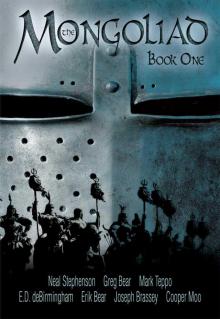 The Mongoliad: Book One
The Mongoliad: Book One Snow Crash
Snow Crash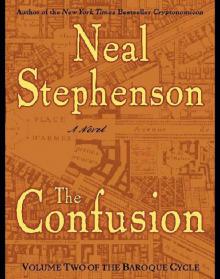 The Confusion: Volume Two of the Baroque Cycle
The Confusion: Volume Two of the Baroque Cycle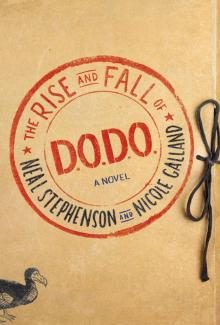 The Rise and Fall of D.O.D.O.
The Rise and Fall of D.O.D.O. The Diamond Age: Or, a Young Lady's Illustrated Primer
The Diamond Age: Or, a Young Lady's Illustrated Primer The Big U
The Big U The System of the World: Volume Three of the Baroque Cycle
The System of the World: Volume Three of the Baroque Cycle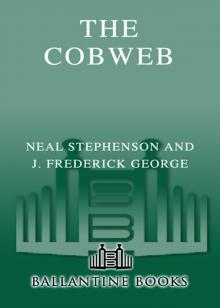 The Cobweb
The Cobweb Reamde
Reamde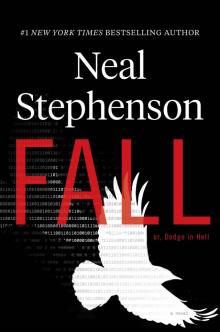 Fall; or, Dodge in Hell
Fall; or, Dodge in Hell Interface
Interface Quicksilver
Quicksilver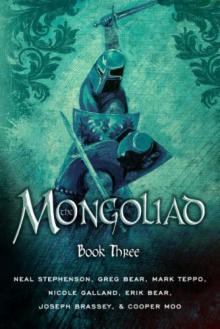 The Mongoliad: Book Three
The Mongoliad: Book Three Seveneves
Seveneves Atmosphæra Incognita
Atmosphæra Incognita In the Beginning...Was the Command Line
In the Beginning...Was the Command Line Anathem
Anathem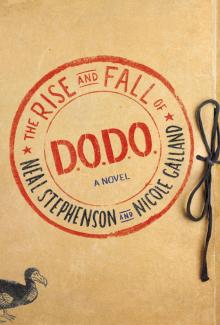 The Rise and Fall of D.O.D.O.: A Novel
The Rise and Fall of D.O.D.O.: A Novel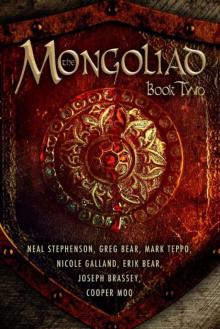 The Mongoliad: Book Two
The Mongoliad: Book Two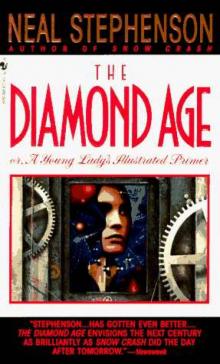 Diamond Age or a Young Lady's Illustrated Primer
Diamond Age or a Young Lady's Illustrated Primer THE System OF THE WORLD
THE System OF THE WORLD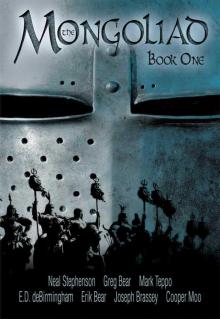 The Mongoliad: Book One tfs-1
The Mongoliad: Book One tfs-1 Some Remarks: Essays and Other Writing
Some Remarks: Essays and Other Writing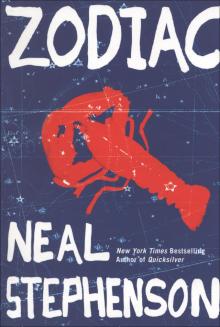 Zodiac
Zodiac Spew
Spew The Baroque Cycle: Quicksilver, the Confusion, and the System of the World
The Baroque Cycle: Quicksilver, the Confusion, and the System of the World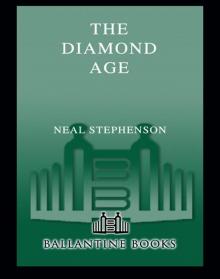 The Diamond Age
The Diamond Age Reamde: A Novel
Reamde: A Novel In the Kingdom of Mao Bell
In the Kingdom of Mao Bell Mother Earth Mother Board
Mother Earth Mother Board Twelve Tomorrows - Visionary stories of the near future inspired by today's technologies
Twelve Tomorrows - Visionary stories of the near future inspired by today's technologies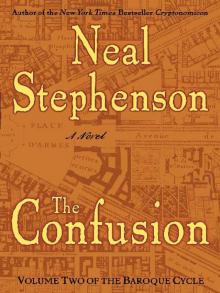 The Confusion
The Confusion The Great Simoleon Caper
The Great Simoleon Caper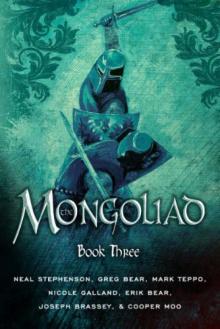 The Mongoliad: Book Three tfs-3
The Mongoliad: Book Three tfs-3